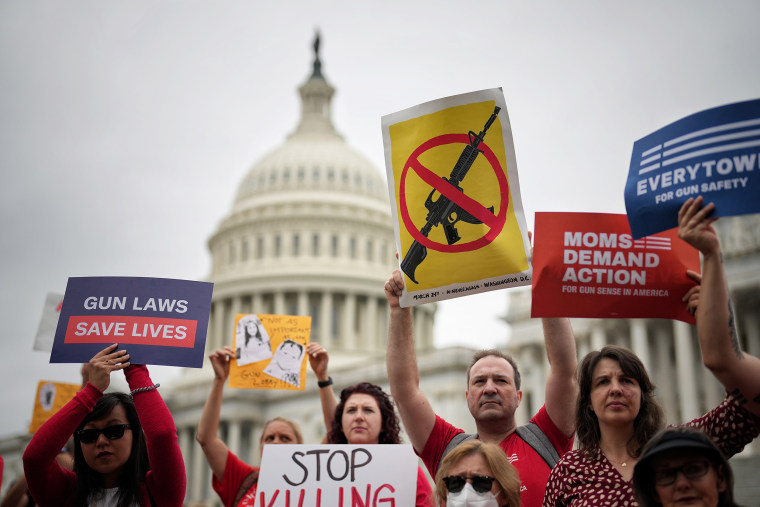WASHINGTON — A bipartisan group of senators on Thursday kicked off informal talks on gun safety legislation after a pair of horrific mass shootings at a Texas elementary school and a New York grocery store injected new life into stalled efforts to combat gun violence.
The talks are being led by two Connecticut Democrats, Sens. Chris Murphy and Richard Blumenthal, who were heavily involved in the failed efforts to pass background check legislation in the wake of the Sandy Hook Elementary School shooting in their state nearly a decade ago.
The group met Thursday in Murphy’s “hideaway,” a small private space he has in the basement of the Senate.
Other Democrats in attendance were Kyrsten Sinema of Arizona, Martin Heinrich of New Mexico and Joe Manchin of West Virginia.
The Republicans who joined the meeting were Sens. Susan Collins of Maine, Lindsey Graham of South Carolina and Pat Toomey of Pennsylvania. Bill Cassidy of Louisiana joined by phone.
Negotiators said they will break off into smaller working groups to focus on specific pieces of a potential gun safety package. For example, Manchin and Toomey had struck a deal on background checks after the Sandy Hook massacre, but it was defeated in 2013. They will revive those efforts.
"Joe and I have a long history of working together, a history of mutual respect and friendship. That's my relationship with Joe," Toomey told NBC News after the meeting.
Senate Minority Leader Mitch McConnell, R-Ky., said that he encouraged Sen. John Cornyn, R-Texas, to meet with the group and that he was "hopeful that we could come up with a bipartisan solution that’s directly related to the facts of this awful massacre."
It’s unclear what — if anything — the new bipartisan group will be able to accomplish.
During the past decade, the nation has been traumatized by a seemingly endless list of mass shootings — in Tucson, Arizona; Aurora, Colorado; Newtown, Connecticut; Charleston, South Carolina; Las Vegas; Parkland, Florida; San Bernardino, California. And yet Congress has been paralyzed with inaction on gun safety measures, largely because of Senate Republicans who say solutions to gun violence should come from states rather than Washington.

On Thursday, Senate Republicans blocked a House-passed bill to improve communication and information-sharing among law enforcement agencies when it comes to white supremacist and other domestic terrorist groups. That was a response to the May 14 shooting in Buffalo, New York, where a gunman targeted Black shoppers in a grocery store, killing 10.
Senate negotiators are tamping down expectations and taking a more realistic approach.
“It won’t be everything I want. It won’t be universal background checks. It likely won’t be a ban on assault weapons. But, you know, maybe it’s an expansion of background checks. Maybe it’s red flag laws. Maybe it’s adjusting the age that you can purchase weapons,” Murphy said Thursday on MSNBC’s “Andrea Mitchell Reports.”
“Whatever it is, if it saves lives, it’s good enough for me. It’s a start. So I’m sober-minded about our prospects, our chances of success, but I’m going to do my best.”
As Murphy acknowledged that universal background checks and a ban on so-called assault weapons won't be included in the package, President Joe Biden injected himself into the negotiations by specifying for the first time since the Uvalde shooting what exactly he wants lawmakers to do.
"Congress needs to pass universal background checks, ban assault weapons and high-capacity magazines," Biden tweeted Thursday. "It’s time to turn this pain into action."
While those moves aren't on the table, one idea that does seem to be gaining some bipartisan traction has to do with so-called red flag laws, which allow authorities to confiscate firearms from people who are deemed to be dangers to themselves or others.
Sen. Marco Rubio, R-Fla., rolled out legislation to provide incentives for states — through Justice Department grants — to enact red flag laws like the one in Florida. The bill was a response to the shooting in 2018 at Marjory Stoneman Douglas High School in Parkland, where a 19-year-old gunman murdered 17 people, most of them students.
Graham and Blumenthal also have teamed up on similar red flag legislation centering on incentives for states and establishing national standards for red flag laws. They will break off from the larger group and work on a new red flag proposal.
But both Democrats and Republicans conceded that legislation mandating a red flag law across all 50 states would never secure the 60 votes needed to clear the Senate.
“There’s no mystery about taking away a firearm, a weapon, from someone who shows they are dangerous to themselves or others, someone who says ‘I’m going to kill people’ or ‘I’m going to kill myself,’” Blumenthal said at a rally with dozens of gun safety activists sporting red shirts outside the Capitol.
“A red flag statute is imperative. … And I want to see a vote on the floor of the United States Senate on background checks and a red flag statute.”
Senate Majority Leader Chuck Schumer, D-N.Y., has agreed to give Murphy and Blumenthal’s group 10 days to reach a bipartisan deal on gun safety. If they fail, he has vowed to bring a pair of House-passed bills to the Senate floor that would expand background checks for gun purchases.
Schumer was skeptical, saying Democrats have been "burned so many times before" on gun measures. Sen. Elizabeth Warren, D-Mass., also isn't holding her breath.
"I'll believe it when I see it," Warren told reporters. "The Republicans want to talk and deflect and change the subject until the world moves on without ever doing anything about gun violence in this country. ...
"Guns are the issue, and that's what Republicans don't want to talk about."

